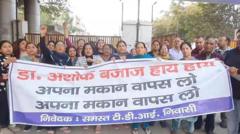A Muslim couple in Moradabad, India, has been compelled to sell their newly acquired home due to protests from their Hindu neighbors, illustrating ongoing communal tensions in the region. The episode began when residents of the affluent TDI City expressed their discontent after the couple purchased the property, asserting that they would refuse to coexist with a Muslim family based on religious grounds.
Video footage from the protests, which gained extensive attention, featured a Hindu resident, Megha Arora, vocalizing the community's stance. She argued that having a Muslim family live near a local temple posed a risk to community safety, particularly for women. She stated, "We cannot tolerate a Muslim family living right in front of our local temple," insisting that the sale be annulled and the house's registration revoked.
Local residents took their objections further by visiting the district magistrate's office to file formal complaints. During the protest, hostile slogans were directed at both the former owner of the house, Dr. Ashok Bajaj, and the Muslim couple. Facing mounting pressure, Bajaj revealed that a resolution had been reached, facilitating the couple's return of the house to a Hindu family within the community. The couple, both professionals in the medical field, expressed their discomfort with the situation, stating they were no longer willing to move into the home.
Bajaj highlighted the unexpected nature of the backlash, emphasizing that there had been no prior issues with Muslim residents in the community. He noted, "We had always had a good rapport with our neighbors," which he found surprising given the deep-rooted communal divisions present in many areas of India.
Moradabad has witnessed similar incidents of discrimination against Muslim families seeking homes in Hindu-majority neighborhoods. Segregation has historically persisted in many parts of India, and the urban melting pot theory has often failed to materialize in reality, leading to ongoing divisions along religious lines.
Experts have raised concerns about the legal implications of this incident. Tanvir Aeijaz, a professor at Delhi University, characterized the denial of housing based on religion as discriminatory and unconstitutional. He articulated that the situation represents a broader systemic issue impacting minority rights in India, particularly in an environment where anti-Muslim sentiments are reportedly on the rise under the current government.
Social media reactions to the incident have emphasized outrage and a call for reflection on national identity and values, challenging the notion of unity in diversity that India often promotes. As discussions surrounding this controversy continue, concerns about religious polarization in India linger, with advocates hoping for a positive shift towards inclusivity and pluralism.




















